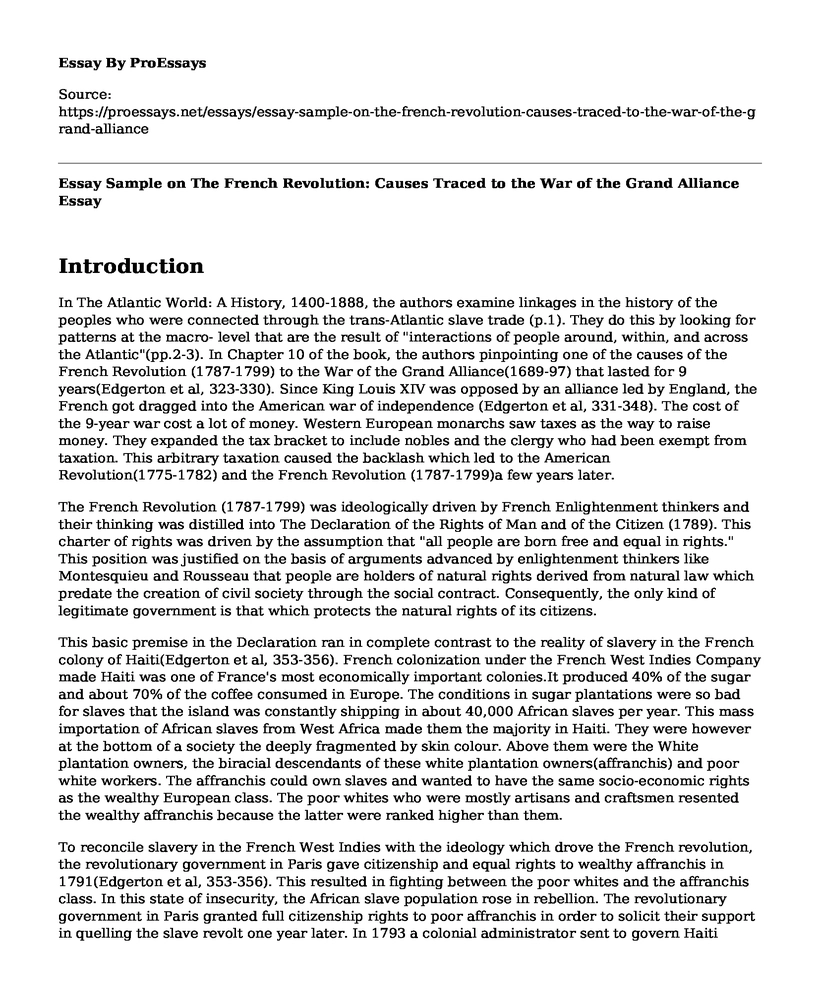Introduction
In The Atlantic World: A History, 1400-1888, the authors examine linkages in the history of the peoples who were connected through the trans-Atlantic slave trade (p.1). They do this by looking for patterns at the macro- level that are the result of "interactions of people around, within, and across the Atlantic"(pp.2-3). In Chapter 10 of the book, the authors pinpointing one of the causes of the French Revolution (1787-1799) to the War of the Grand Alliance(1689-97) that lasted for 9 years(Edgerton et al, 323-330). Since King Louis XIV was opposed by an alliance led by England, the French got dragged into the American war of independence (Edgerton et al, 331-348). The cost of the 9-year war cost a lot of money. Western European monarchs saw taxes as the way to raise money. They expanded the tax bracket to include nobles and the clergy who had been exempt from taxation. This arbitrary taxation caused the backlash which led to the American Revolution(1775-1782) and the French Revolution (1787-1799)a few years later.
The French Revolution (1787-1799) was ideologically driven by French Enlightenment thinkers and their thinking was distilled into The Declaration of the Rights of Man and of the Citizen (1789). This charter of rights was driven by the assumption that "all people are born free and equal in rights." This position was justified on the basis of arguments advanced by enlightenment thinkers like Montesquieu and Rousseau that people are holders of natural rights derived from natural law which predate the creation of civil society through the social contract. Consequently, the only kind of legitimate government is that which protects the natural rights of its citizens.
This basic premise in the Declaration ran in complete contrast to the reality of slavery in the French colony of Haiti(Edgerton et al, 353-356). French colonization under the French West Indies Company made Haiti was one of France's most economically important colonies.It produced 40% of the sugar and about 70% of the coffee consumed in Europe. The conditions in sugar plantations were so bad for slaves that the island was constantly shipping in about 40,000 African slaves per year. This mass importation of African slaves from West Africa made them the majority in Haiti. They were however at the bottom of a society the deeply fragmented by skin colour. Above them were the White plantation owners, the biracial descendants of these white plantation owners(affranchis) and poor white workers. The affranchis could own slaves and wanted to have the same socio-economic rights as the wealthy European class. The poor whites who were mostly artisans and craftsmen resented the wealthy affranchis because the latter were ranked higher than them.
To reconcile slavery in the French West Indies with the ideology which drove the French revolution, the revolutionary government in Paris gave citizenship and equal rights to wealthy affranchis in 1791(Edgerton et al, 353-356). This resulted in fighting between the poor whites and the affranchis class. In this state of insecurity, the African slave population rose in rebellion. The revolutionary government in Paris granted full citizenship rights to poor affranchis in order to solicit their support in quelling the slave revolt one year later. In 1793 a colonial administrator sent to govern Haiti realized that it is only by abolishing slavery that France would not lose the colony to Britain or Spain. He offered freedom and full rights under French law to slaves who joined his army. His decision was ratified by the French government a year later. This decision to abolish slavery and the tenets of the French revolution codified in the Declaration put Haiti's population of African slaves on the path to defeating Napoleon's army and becoming the first and only nation created by former slaves who had defeated their white slave masters.
Reference
Egerton, Douglas R. The Atlantic World: A History, 1400-1888. Wiley Blackwell, 2007.
Cite this page
Essay Sample on The French Revolution: Causes Traced to the War of the Grand Alliance. (2023, Jan 04). Retrieved from https://proessays.net/essays/essay-sample-on-the-french-revolution-causes-traced-to-the-war-of-the-grand-alliance
If you are the original author of this essay and no longer wish to have it published on the ProEssays website, please click below to request its removal:
- The Myths of Ancient Egypt
- Why the American Lost Trust in the Federal Government Since the 1960s? - Research Paper
- The Classical Age of World History (500BCE-500CE): Greece, China and India Essay
- Essay Example on Clausewitz: Military Theorist, Prussian General, Hegelian Dialectician
- The Thirty Years' War: Europe's Brutal Religious Conflict - Essay Sample
- Essay Example on Sociology & Holocaust/Genocide: A Complex Relation
- The Pyramids - Free Essay Sample







